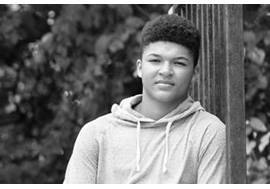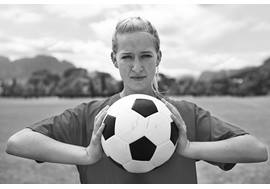Complex Concussion Clinic
If your concussion is taking longer than the usual one to three weeks to heal, your physician may refer you to the Complex Concussion Clinic at Nationwide Children’s Hospital. As one of only a few of its kind in the nation, the Complex Concussion Clinic offers unique access to multidisciplinary care. Customized active rehabilitation care plans are designed to meet the needs of each patient and family. The active rehabilitation strategy supports our goal to get you back to your life – in the classroom, on the field or on the stage – as quickly as possible.

Neurology is a top 10 specialty according to U.S. News and World Report.
About Our Clinic
Prolonged concussions are rarely the result of a single factor. This is why our team of specialists – led by co-directors with expertise in neurology, sports concussion and neuropsychology – works together to assess patients and develop comprehensive care plans tailored to their needs.
Our unique approach to multidisciplinary care means the Complex Concussion Clinic is your one stop for care when dealing with ongoing symptoms. Streamlined clinic visits involve a range of specialists, removing the need for multiple appointments and referrals.
For your initial visit, you can expect to meet with a neurologist, neuropsychologist, physical therapist and functional rehabilitation specialist (athletic trainer). The experts collaborate to customize the care path and treatment strategy for the symptoms and goals of each patient, with the ultimate goal of returning each patient to his or her sport, performance, activities and day-to-day life.
The Complex Concussion Clinic is led by two co-directors with interests and experiences that support the collaborative and innovative mission of the clinic. Co-director Sean Rose, MD, is one of only a few child neurologists in the United States trained in the management of concussion by completing a fellowship in Sports Neurology. Co-director Kelly McNally, PhD, is a board-certified pediatric neuropsychologist with expertise in the psychological and cognitive aspects of concussion, which is a key component of the clinic’s comprehensive care and philosophy.
About Our Team
Co-directors Sean Rose, MD, and Kelly McNally, PhD, lead the Complex Concussion Clinic. The multidisciplinary team also includes experts in physical therapy and functional rehabilitation.

Sean Rose, MD, is a pediatric sports neurologist and co-director of the Complex Concussion Clinic at Nationwide Children’s Hospital, and assistant professor of Pediatrics at The Ohio State University. His clinical practice focuses on concussion and other neurological conditions in athletes. His research interests include the neurocognitive effects of sub-concussive impacts and the physiological mechanisms of concussion and post-concussion syndrome.
Among his experiences, Dr. Rose has provided sideline coverage for multiple high schools, division 1 collegiate athletics programs, and a semi-pro soccer team. He was also a consultant for the NBA’s concussion program and led a multi-year prospective outcomes study in youth football players.

Kelly McNally, PhD, is a pediatric neuropsychologist and co-director of the Complex Concussion Clinic at Nationwide Children's Hospital and a clinical assistant professor of Pediatrics at The Ohio State University. Her clinical interests include pediatric neuropsychology and concussion, among other areas, with significant experience evaluating and treating individuals with concussion. Her research interests include psychological and neuropsychological comorbidities in pediatric epilepsy and post-concussive symptoms in children with mild traumatic brain injury, and she has authored several publications on topics related to her research.

Cody Solesbee, PhD
Neuropsychology
What happens in the Complex Concussion Clinic?
Your first visit takes about three hours. You will spend time with different specialists. These include:- Neurologist: The pediatric neurologist serves as the “quarterback” for the care team. This doctor assesses the extent of the brain injury and past injuries, and then gets input from the other providers to develop a treatment plan.
- Neuropsychologist: The pediatric neuropsychologist assesses cognitive (mental) function and helps with problems in school, social functioning, emotions and mood.
- Physical Therapist: Physical therapists assess vestibular function (dizziness) and neck problems. They provide in-clinic therapy as well as instructions on exercises to be done at home.
- Athletic Trainer: Athletic trainers look at current physical fitness level and patient goals for physical exercise. They then guide the patient through a supervised workout program in line with their current fitness level.
Locations and Directions
Complex Concussion Clinic appointments may be scheduled at the following locations:
If you have questions about the clinic or your upcoming visit, call the Neurology clinic line at (614) 722-4625.
Research & Innovation
We are focused on making advances in the diagnosis, treatment and prevention of concussion. The research interests of clinic faculty include:
- Neurocognitive effects of sub-concussive impacts
- Physiological mechanisms of concussion and post-concussion syndrome
- Psychological, cognitive and behavioral interventions for post-concussion syndrome
- Exercise and active rehabilitation treatments for concussion and post-concussion syndrome
Our providers have led or collaborated with other clinicians on the following publications:
- “The Relationship of Adolescent and Parent Preferences for Treatment Modality with Satisfaction, Attrition, Adherence, and Efficacy: The Coping with Head Injury through Problem-Solving (CHIPS) Study.” Journal of Pediatric Psychology. November 2018.
- “Head Impact Burden and Change in Neurocognitive Function during a Season of Youth Football.” Journal of Head Trauma Rehabilitation. October 2018.
- “Brief Cognitive Behavioral Intervention for Children and Adolescents with Persistent Post-Concussive Symptoms: A Pilot Study.” Child Neuropsychology. April 2018.
- “Comparative Effectiveness of Family Problem-Solving Therapy (F-PST) for Adolescents after Traumatic Brain Injury: Protocol for a Randomized, Multicenter, Clinical Trial.” Contemporary Clinical Trials Communications. April 2018.
- “Utilization of Conventional Neuroimaging Following Youth Concussion.” Brain Injury. January 2017.
- “Specific Factors Influence Post-Concussion Symptom Duration among Youth Referred to a Sports Concussion Clinic.” Journal of Pediatrics. July 2016.
- “Post-Traumatic Headaches Correlate with Migraine Symptoms in Youth with Concussion.”Cephalalgia. April 2016.
- “Physicians’ Management Practices and Perceived Health Risks When Post-Concussion Symptoms Persist.” Sports Health. January 2016.
- “Which Factors Affect Daily Compliance with an Internet Headache Diary Among Youth With Migraine?” The Clinical Journal of Pain. December 2015.
- “Returning the Student to School after Concussion: What do Clinicians Need to Know?” Concussion. August 2015.
- “The Diagnosis and Management of Concussion in Children and Adolescents.” Pediatric Neurology. August 2015.
- “How Long is Too Long? The lack of Consensus Regarding the Post-Concussion Syndrome Diagnosis.” Brain Injury. April 2015.
- “High School Principals’ Resources, Knowledge and Practices Regarding the Returning Student with Concussion.” Journal of Pediatrics. March 2015.
- “Specific Headache Factors Predict Sleep Disturbances Among Youth with Migraine.” Pediatric Neurology. October 2014.
- “PedMIDAS-based Scoring Underestimates Migraine Disability on Non-School Days.” Headache. June 2014.
- “Comparing Patient and Parent Recall of 90-day and 30-day Migraine Disability Using Elements of the PedMIDAS and an Internet Headache Diary.” Cephalalgia. April 2014.
- “Injury Versus Non-Injury Factors as Predictors of Post-Concussive Symptoms Following Mild Traumatic Brain Injury in Children.” Neuropsychology. January 2013.





